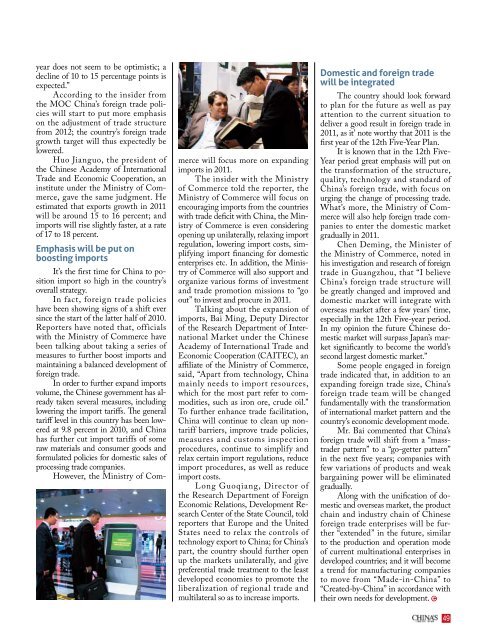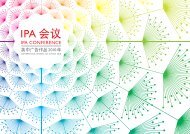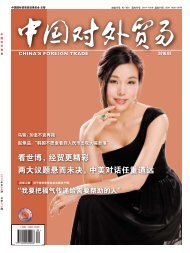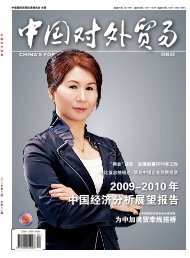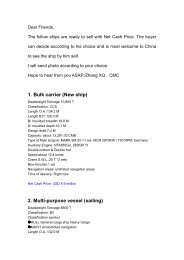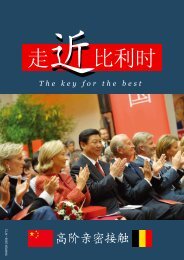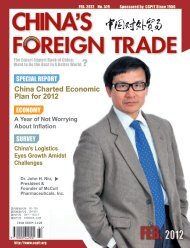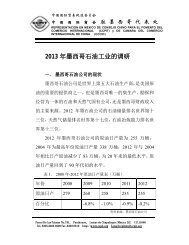You also want an ePaper? Increase the reach of your titles
YUMPU automatically turns print PDFs into web optimized ePapers that Google loves.
year does not seem to be optimistic; a<br />
decline of 10 to 15 percentage points is<br />
expected.”<br />
According to the insider from<br />
the MOC China’s foreign trade policies<br />
will start to put more emphasis<br />
on the adjustment of trade structure<br />
from 2012; the country’s foreign trade<br />
growth target will thus expectedly be<br />
lowered.<br />
Huo Jianguo, the president of<br />
the Chinese Academy of International<br />
Trade and Economic Cooperation, an<br />
institute under the Ministry of Commerce,<br />
gave the same judgment. He<br />
estimated that exports growth in 2011<br />
will be around 15 to 16 percent; and<br />
imports will rise slightly faster, at a rate<br />
of 17 to 18 percent.<br />
Emphasis will be put on<br />
boosting imports<br />
It’s the first time for China to position<br />
import so high in the country’s<br />
overall strategy.<br />
In fact, foreign trade policies<br />
have been showing signs of a shift ever<br />
since the start of the latter half of 2010.<br />
Reporters have noted that, officials<br />
with the Ministry of Commerce have<br />
been talking about taking a series of<br />
measures to further boost imports and<br />
maintaining a balanced development of<br />
foreign trade.<br />
In order to further expand imports<br />
volume, the Chinese government has already<br />
taken several measures, including<br />
lowering the import tariffs. The general<br />
tariff level in this country has been lowered<br />
at 9.8 percent in 2010, and China<br />
has further cut import tariffs of some<br />
raw materials and consumer goods and<br />
formulated policies for domestic sales of<br />
processing trade companies.<br />
However, the Ministry of Commerce<br />
will focus more on expanding<br />
imports in 2011.<br />
The insider with the Ministry<br />
of Commerce told the reporter, the<br />
Ministry of Commerce will focus on<br />
encouraging imports from the countries<br />
with trade deficit with China, the Ministry<br />
of Commerce is even considering<br />
opening up unilaterally, relaxing import<br />
regulation, lowering import costs, simplifying<br />
import financing for domestic<br />
enterprises etc. In addition, the Ministry<br />
of Commerce will also support and<br />
organize various forms of investment<br />
and trade promotion missions to “go<br />
out” to invest and procure in 2011.<br />
Talking about the expansion of<br />
imports, Bai Ming, Deputy Director<br />
of the Research Department of International<br />
Market under the Chinese<br />
Academy of International Trade and<br />
Economic Cooperation (CAITEC), an<br />
affiliate of the Ministry of Commerce,<br />
said, “Apart from technology, China<br />
mainly needs to import resources,<br />
which for the most part refer to commodities,<br />
such as iron ore, crude oil.”<br />
To further enhance trade facilitation,<br />
China will continue to clean up nontariff<br />
barriers, improve trade policies,<br />
measures and customs inspection<br />
procedures, continue to simplify and<br />
relax certain import regulations, reduce<br />
import procedures, as well as reduce<br />
import costs.<br />
Long Guoqiang, Director of<br />
the Research Department of Foreign<br />
Economic Relations, Development Research<br />
Center of the State Council, told<br />
reporters that Europe and the United<br />
States need to relax the controls of<br />
technology export to China; for China’s<br />
part, the country should further open<br />
up the markets unilaterally, and give<br />
preferential trade treatment to the least<br />
developed economies to promote the<br />
liberalization of regional trade and<br />
multilateral so as to increase imports.<br />
Domestic and foreign trade<br />
will be integrated<br />
The country should look forward<br />
to plan for the future as well as pay<br />
attention to the current situation to<br />
deliver a good result in foreign trade in<br />
2011, as it’ note worthy that 2011 is the<br />
first year of the 12th Five-Year Plan.<br />
It is known that in the 12th Five-<br />
Year period great emphasis will put on<br />
the transformation of the structure,<br />
quality, technology and standard of<br />
China’s foreign trade, with focus on<br />
urging the change of processing trade.<br />
What’s more, the Ministry of Commerce<br />
will also help foreign trade companies<br />
to enter the domestic market<br />
gradually in 2011.<br />
Chen Deming, the Minister of<br />
the Ministry of Commerce, noted in<br />
his investigation and research of foreign<br />
trade in Guangzhou, that “I believe<br />
China’s foreign trade structure will<br />
be greatly changed and improved and<br />
domestic market will integrate with<br />
overseas market after a few years’ time,<br />
especially in the 12th Five-year period.<br />
In my opinion the future Chinese domestic<br />
market will surpass Japan’s market<br />
significantly to become the world’s<br />
second largest domestic market.”<br />
Some people engaged in foreign<br />
trade indicated that, in addition to an<br />
expanding foreign trade size, China’s<br />
foreign trade team will be changed<br />
fundamentally with the transformation<br />
of international market pattern and the<br />
country’s economic development mode.<br />
Mr. Bai commented that China’s<br />
foreign trade will shift from a “masstrader<br />
pattern” to a “go-getter pattern”<br />
in the next five years; companies with<br />
few variations of products and weak<br />
bargaining power will be eliminated<br />
gradually.<br />
Along with the unification of domestic<br />
and overseas market, the product<br />
chain and industry chain of Chinese<br />
foreign trade enterprises will be further<br />
“extended” in the future, similar<br />
to the production and operation mode<br />
of current multinational enterprises in<br />
developed countries; and it will become<br />
a trend for manufacturing companies<br />
to move from “Made-in-China” to<br />
“Created-by-China” in accordance with<br />
their own needs for development.<br />
49


